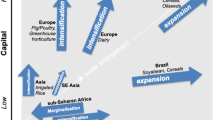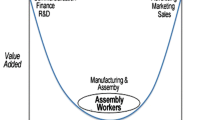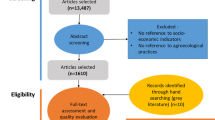Abstract
In the mid-1990s, fairtrade-organic registration data showed that only 9 % of Oaxaca, Mexico’s organic coffee ‘farm operators’ were women; by 2013 the female farmer rate had increased to 42 %. Our research investigates the impact of this significant increase in women’s coffee association participation among 210 members of two coffee producer associations in Oaxaca, Mexico. We find that female coffee organization members report high levels of household decision-making power and they are more likely than their male counterparts to report control over their coffee income. These significant advances in women’s agency within the household are offset by the fact that the women experience significant time poverty as they engage in coffee production while bearing a disproportionate share of domestic labor obligations. The women coffee producers view organizational labor as a third burden on their time, after their reproductive and productive labor. The time poverty they experience limits their ability to fully participate in coffee organizational governance and consequently there are few women leaders at all levels of the coffee producer businesses. This is problematic because it limits women’s ability to fully benefit from organizational membership: when women fully participate in governance they gain valuable business and leadership skills and producer associations with active female members may also be more likely to develop and maintain programs and policies that enhance gender equity. Our findings indicate that targeted agricultural development programs to improve gender equity among agricultural smallholders should involve creative ways to ease women’s labor burdens and reduce their time poverty in order to facilitate full organizational participation. The research findings fill a gap in existing studies of agricultural global value chains (GVCs) by demonstrating how the certified coffee GVC depends on women’s under and un-paid labor not only within the household but also within producer organizations.
Similar content being viewed by others
Notes
The FAO estimates that if women had the same access to productive resources as men they could increase yields by 20–30 %. This increased productivity would reduce the number of hungry people in the world by 12–17 % (FAO 2011). A study across multiple developing countries showed that women spend on average 90 % of their income supporting family needs whereas men devote only 40 % of their own income to the same (Smith and Haddad 2000).
The organizations’ names are pseudonyms to protect participant confidentiality.
This statistic is derived from an analysis of a statewide producer database, which includes more than 4000 registered organic coffee farmers. It parallels similar changes evident in the producer databases maintained by CERTIMEX, an organic coffee certifier.
In our study, 80 % of surveyed members in UPCOBJ and 67 % in the Café de Oro identified as comuneros, although the actual number might be higher as many respondents chose not to provide this information.
Plan 2011; 89 % of Oaxaca's coffee farmers own plots smaller than five hectares (Porter 2002) and there are 104,879 registered coffee farmers in the state [out of a total 511,679 registered Mexican coffee farmers (AMECAFE 2013)].
For a comprehensive look at smallholder coffee production in Oaxaca, see Jaffee (2007).
This rate parallels that found in the sample as a whole which showed 42 % of women joining organizations in the last 10 years (however, in the sample as the whole 34 % of men joined during the same time frame).
154,560 kilos (280 sacks of 69 kilos/container).
The members of both groups, on average, are also older than the sample of 56 non-organized coffee producers (drawn from across the state of Oaxaca) who, on average, are 47 years old.
See the Sustainable Coffee Program’s Coffee Toolkit for more information (Hivos 2014).
This project is similar to the tool libraries that Grassi et al. (2015, p. 21) note have been developed in some African villages where women pool resources to buy tools that are rented at a fixed rate, thereby increasing their productivity and income. They find that the time saved in travel and manual labor reduces women's time poverty.
The WEAI was developed to track the change in women’s empowerment levels that occurs as a direct or indirect result of interventions under Feed the Future, the US government’s global hunger and food security initiative. The United States Agency for International Development, International Food Policy Research Institute, and Oxford Poverty and Human Development Initiative collaboratively developed it (IFPRI 2015).
References
Abdelali-Martini, M., and J. Dey de Pryck. 2015. Does the feminisation of agricultural labour empower women? Insight from female labour contractors and workers in Northwest Syria. Journal of International Development 27: 898–916.
Allen, P., and C. Sachs. 2007. Women and food chains: The gendered politics of food. International Journal of Sociology of Food and Agriculture 15(1): 1–23.
Appendini, K. 1999. From where have all the flowers come? Women workers in Mexico’s non-traditional markets. In Women working the NAFTA food chain: Women, food and globalization, ed. D. Barndt, 127–140. Toronto: Sumach Press.
Bain, C. 2014. Chilean temporeras and corporate construction of gender inequalities in global food standards. In Gendered commodity chains: Seeing women’s work and house-holds in global production, ed. W. Dunaway, 119–136. Stanford: Stanford University Press.
Barndt, D. 2008. Tangled routes: Women, work, and globalization on the tomato trail. Lanham, MD: Rowman and Littlefield.
Barrientos, S., C. Dolan, and A. Tallontire. 2003. A gendered value chain approach to codes of conduct in African horticulture. World Development 31(9): 1511–1526.
Blackden, M., and Q. Wodon (eds.). 2006. Gender, time use, and poverty in Sub-Saharan Africa. Washington, DC: The World Bank.
Chant, S. 2008. The ‘feminisation of poverty’ and the ‘feminisation of anti-poverty programmes: Room for revision? Journal of Development Studies 44(2): 165–197.
Chant, S., and M. Guttman. 2002. ‘Men-streaming’ gender? Questions for gender and development policy in the twenty-first century. Progress in Development Studies 2(4): 269–282.
Cook, S., and L. Binford. 1990. Obliging need: Rural petty industry in Mexican capitalism. Austin: University of Texas Press.
CEPCO. 2015. Coordinadora Estatal de Productores de Café del Estado de Oaxaca A.C. Congreso XIII Informe de Actividades 2013–2015. Unpublished report. Oaxaca: CEPCO.
CQI. 2015. Coffee Quality Institute. The way forward: Accelerating gender equity in coffee value chains. Aliso Vieja, CA: Coffee Quality Institute. http://www.coffeeinstitute.org/genderreport/. Accessed 3 Dec 2015.
Danielson, M.S., and T.A. Eisenstadt. 2009. Walking together, but in which direction? Gender discrimination and multicultural practices in Oaxaca, Mexico. Politics and Gender 5(02): 153–184.
Das, R. 2011. Gender in practices of fair trade and decent work production chain analysis in a fair-trade organization in India. Gender, Technology and Development 15(1): 101–125.
Deere, C.D., and C.R. Doss. 2006. The gender asset gap: What do we know and why does it matter? Feminist Economics 12(1–2): 1–50.
DeGuir-Gunby, J.T., P.L. Marshall, and A.W. McCulloch. 2011. Developing and using a codebook for the analysis of interview data: An example from a professional development research project. Field Methods 23(2): 136–155.
Dolan, C., and K. Sorby. 2003. Gender and employment in high-value agriculture industries. Washington, DC: World Bank.
Doss, C. 2013. Data needs for gender analysis in agriculture. IFPRI Discussion Paper 1261. Washington, DC: IFPRI. http://ebrary.ifpri.org/cdm/ref/collection/p15738coll2/id/127482. Accessed 14 June 2016.
Dunaway, W. 2014. Introduction to gendered commodity chains: Seeing women’s work and households in global production. Stanford, CA: Stanford University Press.
ENDIREH. 2006. Centro de Estudios Para el Adelanto de las Mujeres y la Equidad de Género Estudio Comparativo de los Resutados e la Encesta Nacional de la Dinámica de las Relaciones de los Hogares, 2006–2011.
FAO. 2011. Women in agriculture: Closing the gender gap for development. Rome: FAO.
Fletschner, D., and L. Kenney. 2011. Rural women’s access to financial services: Credit, n. ESA Working Paper No. 11-07. March 2011.
Fraser, N. 2009. Feminism, capitalism and the cunning of history. New left Review 56: 97–117.
Gonzalez Manchón, B., and M. MacLeod. 2010. Challenging gender inequality in farmers’ organisations in Nicaragua. Gender and Development 18(3): 373–386.
Grassi, J., J. Lamberg, and S. Huyer. 2015. Running out of time: The reduction of women’s work burden in agricultural production. Rome: FAO.
Gutierrez Rodriguez, E., and J. Brites. 2014. Feminization of labor: Domestic work between regulation and intimacy. Women’s Studies International Forum 46(1): 1–4.
Gutmann, M. 2007. Fixing men: Sex, birth control, and AIDS in Mexico. Berkeley: University of California Press.
Hall, Gillette H., and H. Patrinos. 2012. Indigenous peoples, poverty, and development. New York: Cambridge University Press.
Hivos. 2014. Sustainable coffee program toolkit. http://www.sustainablecoffeeprogram.com/site/getfile.php?id=384. Accessed 10 Nov 2015.
Hunt, C., W.H. Durham, and C.M. Menke. 2015. Social capital in development: Bonds, bridges, and links in Osa and Golfito, Costa Rica. Human Organization 74(3): 217–229.
IFPRI. 2015. Women’s empowerment in agriculture index. http://ebrary.ifpri.org/utils/getfile/collection/p15738coll2/id/126937/filename/127148.pdf. Accessed 11 Nov 2015.
Jaffee, D. 2007. Brewing justice: Fair trade coffee, sustainability, and survival. Berkeley: University of California Press.
Kabeer, N. 2000. Social exclusion, poverty and discrimination: Towards an analytical framework. IDS Bulletin 31(4): 83–97.
Kabeer, N. 2005. Gender equality and women’s empowerment: A critical analysis of the third millennium development goal. Gender and Development 13(1): 13–24.
Kabeer, N. 2015. Gender, poverty and inequality: A brief history of feminist contributions in the field of international development. Gender and Development 23(2): 189–205.
Kasente, D. 2012. Fair trade and organic certification in value chains: Lessons from a gender analysis from coffee exporting in Uganda. Gender and Development 20(1): 111–127.
Kes, A., and H. Swaminathan. 2006. Gender and time poverty in Sub-Saharan Africa. In Gender, time use, and poverty in sub-Saharan Africa, ed. C.M. Blackden, and Q. Wodon, 13–38. Washington, DC: World Bank.
Lastarria-Cornhiel, S. 2006. Feminization of agriculture: Trends and driving forces. Background paper for the World Development Report 2008. Washington, DC: World Bank.
Lastarria-Cornhiel, S. 2009. Land tenure, titling, and gender in Bolivia. Saint Louis University Public Law Review XXIX:193.
Levy, S. 2006. Progress against poverty: Sustaining Mexico’s Progresa-Oportunidades Program. Washington, DC: Brookings Institute Press.
Lyon, S. 2011. Coffee and community: Maya farmers and fair trade markets. Boulder, CO: University Press of Colorado.
Lyon, S., J. Aranda Bezaury, and T. Mutersbaugh. 2010. Gender equity in fairtrade–organic coffee producer organizations: Cases from Mesoamerica. Geoforum 41(1): 93–103.
McFerson, H. 2010. Poverty among women in Sub-Saharan Africa: A review of selected issues. Journal of International Women’s Studies 11(4): 50–72.
Meinzen-Dick, R., A. Quisumbing, J. Behrman, P. Biermayr-Jenzano, V. Wilde, M. Noordeloos, C. Ragasa, and N. Beintema. 2011. Engendering agricultural research, development and extension. Washington, DC: IFPRI.
Mies, M. 2007. Patriarchy and accumulation on a world scale revisited international. Journal of Green Economics 1(3/4): 268.
Molyneux, M. 2006. Mothers at the service of the new poverty agenda: Progresa/Oportunidades, Mexico’s conditional transfer programme. Social Policy and Administration 40(4): 425–449.
Morrison, A., R. Dhushyanth, and N. Sinha. 2007. Gender equality, poverty and economic growth. The World Bank Gender and Development Group Policy Research Working Paper #4349. Washington, DC: World Bank.
Mutersbaugh, T. 2004. To serve and to certify: Organic coffee, certification services and village cargo service in Mexico. Environment and Planning D: Society and Space 22(4): 533–552.
Nader, L. 1990. Harmony ideology: Justice and control in a Zapotec mountain village. Stanford, CA: Stanford University Press.
Nakazibwe, P., and W. Pelupessy. 2014. Towards a gendered agro-commodity approach. Journal of World Systems Research 20(2): 229–256.
Neumann, P. 2013. The gendered burden of development in Nicaragua. Gender and Society 27(6): 799–820.
Nigh, R. 1997. Organic agriculture and globalization: A Maya associative corporation in Chiapas, Mexico. Human Organization 56(4): 427–436.
Palmer, I. 1995. Public finance from a gender perspective. World Development 23(11): 1981–1986.
Pandolfelli, L., R. Meinzen-Dick, and S. Dohrn. 2007. Gender and collective action: A conceptual framework for analysis. Washington, DC: IFPRI. http://ageconsearch.umn.edu/bitstream/47667/2/capriwp64.pdf. Accessed 14 June 2016.
Pérez, R. 2007. Challenges to motherhood: The moral economy of Oaxacan ceramic production and the politics of reproduction. Journal of Anthropological Research 63(3): 305–330.
Peterman, A., J. Behrman, and A. Quisumbing. 2010. A review of empirical evidence on gender differences in nonland agricultural inputs, technology, and services in developing countries. IFPRI Discussion Paper 00975 May 2010.
Porter, R.M. 2002. The coffee farmers revolt in Southern Mexico in the 1980s and 1990s. Lewiston, ME: Edwin Mellen Press.
PROCEDE. 2012. Acuerdo para el cierre operativo del Programa de Certificación de Derechos Ejidales y Titulación de Solares. http://www.ordenjuridico.gob.mx/Federal/PE/APF/APC/SRA/Acuerdos/2006/17112006(1).pdf. Accessed 15 June 2012.
Quisumbing, A., and L. Pandolfelli. 2009. Promising approaches to address the needs of poor female farmers: Resources, constraints, and interventions. World Development 38(4): 581–592.
Quisumbing, A., D. Rubin, C. Manfre, E. Waithanji, and M. van den Bold. 2014. Closing the gender asset gap: Learning from value chain development in Africa and Asia. IFPRI Discussion Paper 01321. Washington, DC: IFPRI.
Radcliffe, S.A. 2015. Dilemmas of difference: Indigenous women and the limits of postcolonial development policy. Durham, NC: Duke University Press.
Ramamurthy, P. 2010. Why are men doing floral sex work? Gender, cultural reproduction, and the feminization of agriculture. Signs 35(2): 397–424.
Razavi, S. 2009. Engendering the political economy of agrarian change. The Journal of Peasant Studies 36(1): 197–226.
Renard, M. 2010. The Mexican coffee crisis. Latin American Perspectives 37(2): 21–33.
Risgaard, L., A.M. Escobar Fibla, and S. Ponte. 2010. Gender and value chains development: An evaluation study. Copenhagen: The Danish Institute for International Studies. https://www.oecd.org/derec/denmark/45670567.pdf. Accessed 14 June 2016.
Sachs, C., and M. Alston. 2010. Global shifts, sedimentations and imaginaries: An introduction to the special issue on women and agriculture. Signs 35(2): 277–287.
Salzinger, L. 2003. Genders in production, making workers in Mexico’s global factories. Berkeley: University of California Press.
Smith, K. 2014. Ethical trade, gender and sustainable livelihoods: Women smallholders and ethicality in Kenya. New York: Routledge.
Smith, L., and L. Haddad. 2000. Explaining child malnutrition in developing countries. Washington, DC: IFPRI.
Smith-Oka, V. 2013. Shaping the motherhood of indigenous Mexico. Nashville, TN: Vanderbilt University Press.
Tallontire, A., C. Dolan, S. Smith, and S. Barrientos. 2005. Reaching the Marginalised? Gender value chains and ethical trade in African horticulture. Development in Practice 15(3–4): 559–571.
Terstappen, V., L. Hanson, and D. McLaughline. 2013. Gender, health, labor, and inequities: A review of the fair and alternative trade literature. Agriculture and Human Values 30(1): 21–39.
Twin Trading. 2013. Empowering women farmers in agricultural value chains. London, England: Twin Trading. http://www.twin.org.uk/assets/Twin-reports/Empowering-Women-Farmers-in-Agricultural-Value-Chains-1.pdf. Accessed 3 Nov 2015.
USDA. 2010. GAIN Report, Mexico: 7 May 2010, XM003. http://gain.fas.usda.gov/Recent%20GAIN%20Publications/Coffee%20Annual_Mexico%20City_Mexico_5-24-2010.pdf. Accessed 17 Oct 2015.
Vargas Hill, R., and M. Vigneri. 2011. Mainstreaming gender sensitivity in cash crop market supply chains. ESA Working Paper No. 11-08. Rome: FAO.
Velásquez, M.C. 2004. Migrant communities, gender, and political power in Oaxaca. In Indigenous Mexican migrants in the United States, ed. Jonathan Fox, and Gaspar Rivera-Salgado, 483–510. Boulder, CO: Lynne Rienner Publishers.
Werner, M. 2012. Beyond upgrading: Gendered labor and the restructuring of firms in the Dominican Republic. Economic Geography 88(4): 403–422.
World Bank. 2011. World development report 2012: Gender equity and development. http://siteresources.worldbank.org/INTWDR2012/Resources/7778105-1299699968583/7786210-1315936222006/Complete-Report.pdf. Accessed 17 July 2014.
Wright, M. 2006. Disposable women and other myths of global capitalism. New York: Routledge.
Acknowledgments
The authors would like to thank the Weissberg Family Foundation, Root Capital, the College of Arts and Sciences at the University of Kentucky, and the Institute of Sociological Research, Benito Juárez Autonomous University of Oaxaca for their generous funding of this research. The authors thank Arenys Santiago for her assistance with the research and project management and the members of the participating coffee producer organizations. Finally, the authors thank the anonymous reviewers and the editor, Harvey James, for their helpful feedback on earlier versions of this manuscript.
Author information
Authors and Affiliations
Corresponding author
Rights and permissions
About this article
Cite this article
Lyon, S., Mutersbaugh, T. & Worthen, H. The triple burden: the impact of time poverty on women’s participation in coffee producer organizational governance in Mexico. Agric Hum Values 34, 317–331 (2017). https://doi.org/10.1007/s10460-016-9716-1
Accepted:
Published:
Issue Date:
DOI: https://doi.org/10.1007/s10460-016-9716-1




